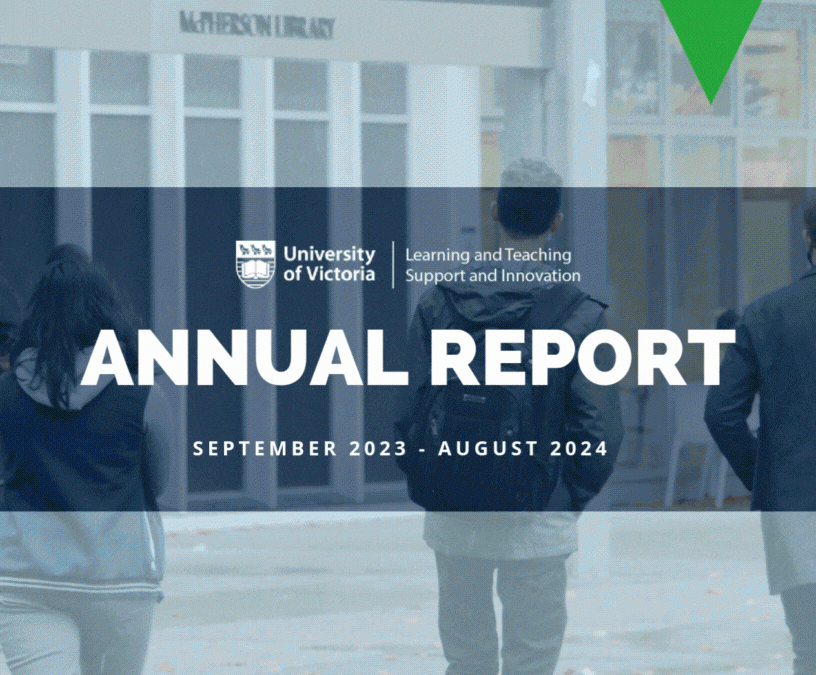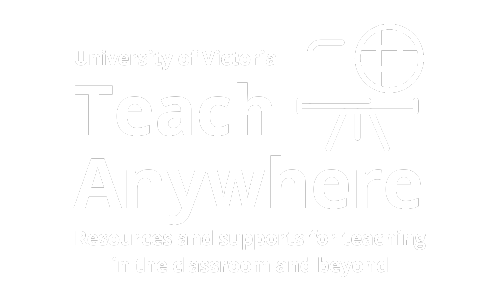Overview
Winter Session 2020/2021 was as fast-paced as the 2019/2020 academic year within the Division of Learning and Teaching Support and Innovation (LTSI). With the arrival of COVID-19 in March 2020, LTSI played a central role in supporting the shift to emergency remote teaching for the completion of Spring and Summer term 2020. LTSI was then responsible for supporting a predominantly online environment for the Winter Session 2020-21 & Summer Term 2021. Fall 2021 brought the return to a pre-dominantly in-person environment where LTSI once again focused on the necessary supports required in the on-campus learning environment. Through the past 20 months, the goal of LTSI has been to align with faculty/instructors to support pedagogically sound research-informed teaching practices, enhance accessibility wherever possible and to focus on supporting student learning in all that we do. In the context of the pandemic LTSI deliberately re-deployed existing positions and resources across five portfolios and with the support of the Office of the Vice-President Academic & Provost added new term positions and resources to further extend capacity to support faculty/instructors and students. This report includes provides an overview of LTSI milestones and initiatives including activities within each of its five portfolios over the 2020/2021 academic year.
Download the full report
Download this report in a PDF form for printing and viewing purposes.
Expansion of learning technologies
- Immediate provision of available technologies to ensure successful completion of the Spring 2020 term, including scheduling and supports for all online exams. Notably, at the time, CourseSpaces was experiencing unexpected and intermittent outages at the time with a high risk for failure of service.
- In partnership with University Systems (SYST), LTSI selected and supported the implementation of new learning technologies (Zoom, Kaltura, Microsoft Teams) and ultimately Brightspace, a new learning management system (LMS). The compressed 2-month time for Brightspace implementation (usually 18-24 months) represents an intense learning curve for everyone requiring LTSI staff to be almost immediately prepared to support faculty/instructors and students in Fall 2020 (approximately 3000 sections).
- LTSI also supported the LMS migration for Continuing Studies (UVCS) in January 2021.
- Subsequently, due to ongoing performance/reliability issues with Kaltura (video-platform), Echo360 was selected (with SYST through a public RFP) as the new video and learning platform in June 2021, with implementation and migrations occurring July – September 2021.
Supports and resources for Faculty/Instructors to enhance digital pedagogy
- Teach Anywhere was constructed as the primary resource for instructors as a resource for the new technologies, effective online pedagogical strategies and as a resource for the myriad of learning and teaching that arose in the transition to online (e.g. academic integrity, online engagement and assessment strategies). A Fall 2021 learning and teaching resource page was also created to include important updates for the back-to-campus transition.
- Development of a new support model that transformed faculty/instructor support from the provision of documentation/instruction to a model that included Faculty specific teams, live support and “hands-on support” combining pedagogical and technology assistance in “real time”.
- LTSI Faculty Support Teams were developed and deployed specific to each Faculty and service unit as a new model of support delivery.
- The Learning Technology Assistants Program was established and Co-op students were hired (80 for Summer and Fall 2020; 40 for Spring 2021; 20 for Summer 2021; 30 for Fall 2021) to provide hands-on supports to faculty/instructors and to support other technology projects within the unit.
- Live support was established ensure instructors had timely and efficient access to learning technology supports and continues to be of great value in the in-person learning and teaching environment.
- With SYST, LTSI supported the implementation of basic class recording in 115 classrooms including the development of two new multi-access classrooms (in partnership with Facilities) and subsequent training for faculty/instructors and students.
Supports and resources for Students and Teaching Assistants
- Learn Anywhere became the main portal for students accessing academic related supports with specific resources and workshops made available throughout the term in the form of blog posts, weekly tips (shared through Brightspace announcements) and Instagram takeovers.
- Continued to offer pre-existing and new student academic supports highly accessible through online, blended and now F2F formats (CAC, MSAC, new Learning Strategists program).
- Provided more effective supports to TAs in supporting instructors, engaging students and effectively using the new learning technologies, including the Learning and Teaching Together with Technology (L3T) Series.
Strategic supports and projects for learning
- Accessibility, although always a significant pedagogical consideration, emerged in a notable and visible way through the pandemic. Accessibility was a key criteria in the selection of learning technologies and in the development of supports for both instructors and students.
- Partnered with the Centre for Accessible Learning (CAL) to hire Learning Experience Designers in Accessibility (3 FTE) to support instructors in their learning, teaching and assessment practices for students with academic accommodations and most recently in the creation of the invigilated Online Assessment Room for both online and in-person courses.
- Conducted an Online Learning and Teaching Student & Instructor Survey to better understand experiences of learning and teaching within a predominantly online environment, analyzing 5242 student and 217 instructor responses, resulting in 6 convergent themes and 7 recommendations.
Forward-thinking
The past 20 months have been challenging, requiring an inordinate amount of change within a short period of time under difficult circumstances. Faculty/instructors and students faced steep learning curves simultaneously adapting to online learning and new technologies. For many, this was a substantial task and quite simply hard. The implementation of the new LTSI support model, combining asynchronous resources with live and hands-on support was instrumental in ameliorating faculty/instructor workload where possible and easing learning curves. However, in the midst of this adversity, there have also been many opportunities for innovation. We have been at the forefront of witnessing faculty/instructors, staff and students rising to the occasion and creating new and innovative ways of learning and teaching. Let’s Talk About Teaching 2020 & 2021 showcased and provided a venue for dialogue as faculty/instructors shared new teaching strategies, their own challenges and offered insights in how to adapt and improve. Through Faculty Support Teams, LTSI had the privilege of working directly with unprecedented numbers of faculty/instructors across UVic as they did their best to teach their courses and support students and we are most grateful for the trust placed in us.
Looking forward, it is unlikely that learning and teaching at UVic will ever fully return to its pre-pandemic state. The adoption of five plus new learning technologies has profoundly expanded the repertoire of available learning tools and now positions UVic well among our comparator post-secondary institutions. The advent of the pandemic has propelled most institutions forward into recognizing the importance of the virtual environment in ways that could not have been imagined pre-pandemic. Digital pedagogies (beyond emergency remote teaching) are now becoming commonplace for many instructors with students requesting more accessibility through virtual platforms. While the vast majority of faculty/instructors and students are pleased to return to the in-person environment, learning technologies now infuse most course offerings (in-person, blended & online) and new course delivery modalities are now available (multi-access classroom). What has not changed is the strategic imperative of LTSI to focus on research-informed approaches to enhancing student learning, ensuring accessibility, and supporting faculty/instructors in effective teaching practices.
Laurene Sheilds
Executive Director and Professor
Division of Learning and Teaching Support and Innovation, University of Victoria
ltsied@uvic.ca
View previous reports

LTSI Annual Report: 2023 to 2024
About This year’s LTSI 2023-2024 Annual Report highlights our commitment to fostering innovation, collaboration, and inclusivity in teaching and learning. From launching new initiatives like the UVicLearn website and Academic Integrity 101 module to advancing accessibility and leveraging data-driven insights, we’ve made significant strides in supporting students, faculty, and staff while laying the foundation for future growth. LTSI by numbers Our three themes Going forward Previous reports...
LTSI Annual Report 2022 to 2023
Over the past year, the Division of Learning and Teaching Support and Innovation has undergone a transformative phase, marking its first full year under new leadership and contending with significant organizational changes, including University wide budget reductions. Our purpose throughout the year remained constant —to prioritize students’ learning journeys and growth by fostering a culture of exceptional teaching and innovation that promotes academic success and personal development.
LTSI Annual Report: 2021 to 2022
In the 2021/2022 reporting cycle, the division of LTSI continued to gain visibility and credibility. The COVID-19 pandemic continued to provide a shift in learning and teaching modalities. We saw a return to in-person classes in Fall of 2021, we continued to navigate through complexity and an ever changing environment, managing increases in-person absences, the provisioning and launching new multi-access classrooms, a robust rollout of technology to support class recordings. Added to this context was an emergency shift to online exams to conclude the Fall term and the launch of the Winter 2022 term online for the first two weeks before returning in-person.
